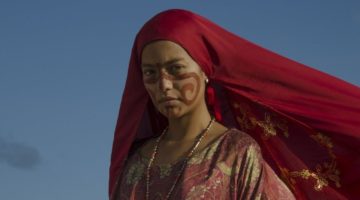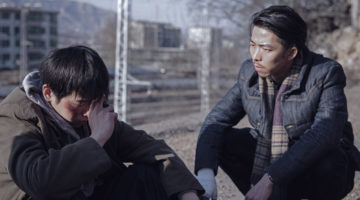Interview: Lupita Nyong'o and David Oyelowo on QUEEN OF KATWE
What was it like to play these real-life characters?
Lupita Nyong’o: This role was attractive to me because it was so different from my own life and own view of the world. I grew up in a family with parents that were very supportive of dreaming and imagination and they provided us with an environment that made it very possible. Here’s a woman, Harriet, who life hasn’t treated so kindly and she is afraid of dreaming. She sees dreaming as the enemy because it results in disappointment. She is raising her family to prepare for the strife that she has known because that’s what she knows life offers you. She has to get to a place where she realizes that in order to truly show her daughter love she has to let her go and risk disappointment but also risk success. That’s what I loved about the character because it was a challenge for me as an actor, who has that very opposite viewpoint. Investigating that kind of thing you learn something about humanity and empathy. When they say, “You belong where you think you belong”, that is true, and what happens in places of poverty is that you are told that you belong nowhere and you are in an environment that is constantly telling you that you are not worth much. So to have someone like a Robert Katende who can inspire so much hope and can inspire to see something in yourself that pushes you, that is amazing. It’s really believing in yourself that gets you through the hardest of circumstances and we see that in Phiona’s story. This girl, despite her very hard circumstances, has become a source of pride for her nation and it was because someone believed in her and allowed her to believe in herself.
Because this is a true story it was priceless and invaluable for me to sit with the real Harriet. There is a quiet dignity about her. Though she is not from much, she has presence that you cannot mess with. She reminds me of a very large tree that is found in very arid areas and they store this water that allows them to survive in these extreme circumstances. And that’s Harriet. She’s very guarded and she’s watchful and protective. Mira, knowing the place and the culture and all that, knew to ensure that that was what came across in the film.
David Oyelowo: When I first read the script and first met Robert, what terrified me was how good he is as a person, saintly almost. By and large that doesn’t make for an interesting character because you want someone with rough edges, someone with a dark past, but really with Robert what you see is what you get in terms of what a wonderful human being he is. The thing that struck me once MIra and I started talking about the role and once I got to Uganda and saw Robert’s actual life is that yes, he is a wonderful human being but the edges and complexity come with the choices he had to make, the sacrificial choices. He was a fantastic soccer player but had an injury, which meant that he couldn’t do that. He is a very bright guy who could have gone on to be a brilliant engineer but chose not to do that in order to give these children what he didn’t have. He was an orphan himself and he grew up in a time of political unrest in Uganda so he has this sort of pain and struggle where the goodness comes from. I made the choice to try and have that under the surface and emerge every now and again, largely when he’s not around the kids because he has to be a father figure to these children. So some of my favorite scenes are with my wife in the film or scenes where I’m a little bit conflicted about the choices I’ve made for the children. Thankfully I had a great director in Mira Nair who is very good with emotional arcs and helped me navigate it all.
It’s worth saying that I don’t go out of my way to play real life characters, I just gravitate towards the things that most compel me and interest me. Maybe those are just the most complex characters that have come my way.
Normally when you play a true life character they are long gone, which is a relief for the actor. The first time I saw the film with Robert was at the premiere here but thankfully he was very teary afterwards and appreciative of my portrayal, which was a relief. But the thing that struck him the most was the scene where I talk about his Mother having passed away and the fact that he didn’t know his Mother and then knew her for a short time and then she was gone again. That was pretty unbearable for him to watch because he still has pain linked to the loss of his Mother, but he thanked me and gave me his seal of approval.
How helpful was it to have Mira Nair, someone very familiar with the Ugandan landscape, direct the film?
LN: I mean I can’t imagine anyone else doing this story justice the way Mira did. Mira has lived in Uganda for over twenty years. She loves the country and knows it from the inside, and she told this story from the inside. I think all too often with African stories there’s an outsider’s perspective and the Africans are the backdrop-things happen to them, they’re not the thing happening. Here Mira did such an incredible job focusing the story, not just on the Africans but on the girl. There’s another version of this story that would have focused on her mentor, but we really see the story from this young girl’s perspective and that is so inspiring to young generations and kids who are coming up in similar circumstances. I just love Mira for that.
DO: When I was last in Uganda I was there for The Last King of Scotland, a very different film. A brilliant film, in my opinion. Forest Whitaker gave an unbelievable performance in that movie but it’s about a Ugandan dictator. By and large that’s more of what we’ve seen coming out of Africa in terms of stories and films made that have crossed over in the Western consciousness, and that has an effect on people’s perceptions of Africa and that has an effect on people who have originated from Africa. Having lived there myself for seven years and being of Nigerian heritage I know that yes, dictators, child soldiers, corruption and poverty are a part of African life but by no means the entirety. Stories like Queen of Katwe happen every day-people who are self possessed enough to help their own communities from within, as opposed to constantly being helped from without, which is what you so often see in these kinds of movies. I have a very particular love for this film because, to me, it’s a balance between those other movies.
Having a female director was very important for this project because if there were a male director there would be the urge to have my character, the mentor, be the protagonist, which is what we’ve seen so often on screen. It’s the coach who goes in and rallies these kids and all of that kind of stuff. As a woman, her perspective is very different. Thankfully it’s this girl, this African girl who is living in a slum who is the person who drives the narrative. It’s one of the unique selling points of the film. It was one of the reasons I really wanted to sign on.
Who has been your greatest teacher and/or mentor?
LN: Well my parents believed in me. I was the kind of child that didn’t want to play outside. I used to hide in a dark closet with a little slit of light, enough to see my dolls, and I’d play in that closet. Then at the dinner table I’d be in my own world and my Mom would be like, “You’re a space cadet, come back to Earth!”. But my parents still supported my dreaming, and my family too. I had an Aunt who, when I was 13, said, “You should audition for the repertory theatre in Nairobi”, and if she hadn’t said that to me I would never have known that I had a talent worth developing. Then I got cast at the age of 14 in Romeo and Juliet, and that was my big break. My Mother took me to rehearsal every day after school and sat in the car for the duration of the rehearsal and then drove me home. If I didn’t have that support I wouldn’t be here today. My Mother will still call me today and say, “Did you have breakfast?” Or “You can’t leave until you have breakfast”, and she’s all the way in Kenya! They were here for the premiere and we’re going to go to Uganda for the premiere there but I told her, “You don’t have to travel all that way to go to the premiere!” But they insisted, “No, we want to be there at the world premiere”, and they’ve been as supportive as they’ve ever been. My Mother drove me to those rehearsals and she will be at all my premieres, come rain or sunshine. When my parents watch my work they often don’t say much. They just sigh and say, “That was good! That was so good!” For all of us, this film is so close to home. It is very rare for us as Africans to see ourselves portrayed in such a positive light on such a large platform. So to see this uplifting story being told by Disney and watching it with 2600 people at the premiere the other night and seeing everyone enjoy the ride with us was overwhelming.
DO: I’ve had a few people who have come alongside me at different points and they are the reason I’m here sitting with you today. Being an actor is tricky because you don’t really know you’re good until someone tells you. It’s not like being a lawyer where you win cases or an accountant where the books are balanced. It is literally incumbent on other people telling you that fact. I can count the people on one hand who have come alongside me at the right time. I have a mentor now, a bit more famous than other people’s mentors, and her name is Oprah Winfrey. She is someone who I seek advice from. One of the biggest opportunities I’ve ever had was her coming alongside me, asking me to play Doctor Martin Luther King, telling me that she truly believes it’s my destiny and doing everything she could to make that happen. She ended up producing that film and it wouldn’t have happened without her. So many of the decisions I make up are influenced by her advice. It’s amazing to have someone like that in your life who’s ahead of you experientially and who you can reach out to and say, “help, I’m struggling”.
Queen of Katwe is currently playing in theatres everywhere.





